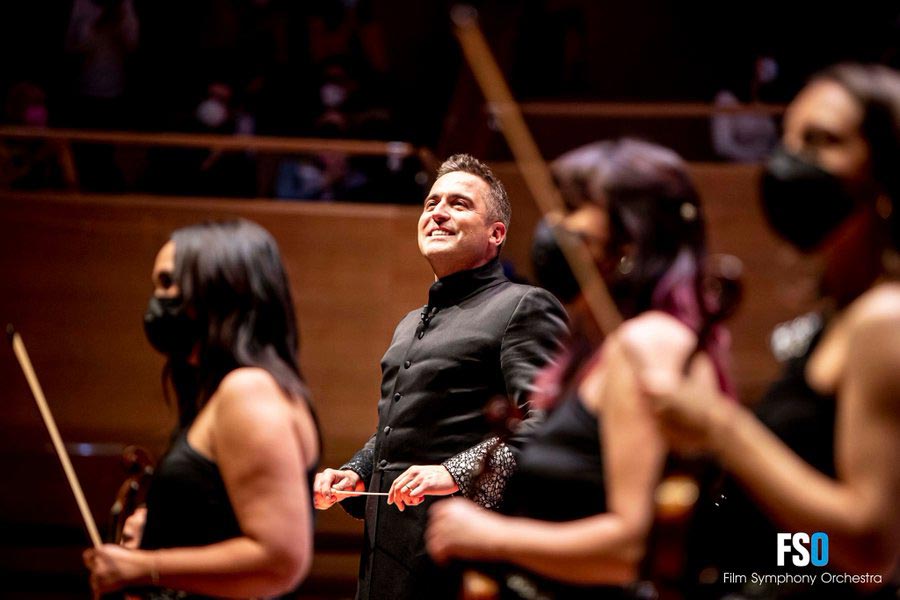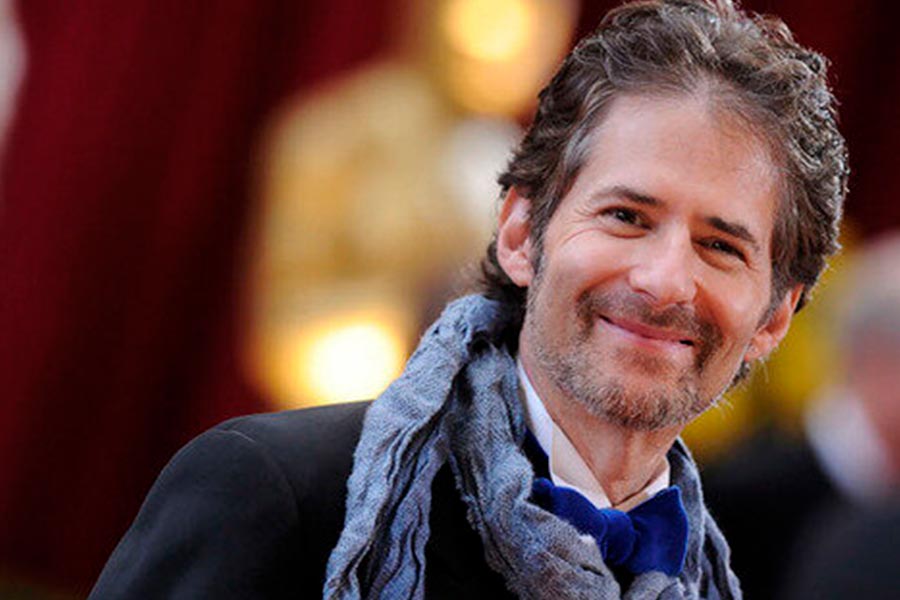James Horner, remembering the great film music composer
James Roy Horner is one of the most extraordinary composers in the history of cinema. Also recognized as an orchestra director, he has more than one hundred scores for the big screen, among which stand out Titanic, best-selling soundtrack in the history of cinema, and Avatar, the highest-grossing film of all time. Due to his enormous influence on the history of film music, we remember in this article the great musician who died in 2015. Discover the best soundtracks by James Horner.
Nominated for the Oscar Awards on ten occasions, two of them in the Best Song section and eight in the Best Soundtrack section, he achieved two figurines of the hand of Titanic, both in one and the other category. These and other reasons, which we will discuss below, are a perfect opportunity to remember the great film music writer.

Who was James Horner?
This American soundtrack composer and conductor was born in Los Angeles in 1953 and died in the Los Padres National Forest, in southern California in 2015. The events occurred when he was piloting a small airplane alone, when he suffered a breakdown that left him caused it to spin in the town of Ventucopa (Santa Bárbara). Horner was passionate about aviation and, unfortunately, his hobby led him to lose his life.
His exceptional talent for music allowed him to play the piano from the age of five, and shortly after he traveled to London to study at the Royal College of Music. He obtained a master's degree in Music at the University of Southern California and, after several specific jobs with the American Film Institute, in the late '70s and early '80s, taught music theory at UCLA. But in a short period of time he realized that he was born to create film music.
James Horner's scores in his early works were at the service of action films such as The lady in red or adventures, like The magnificent ones of space. Later, he wrote an exceptional score for the film Star Trek II: The Wrath of Khan, within the framework of the memorable galactic saga.
In the 90s, Horner left us works such as Braveheart and Apollo XIII, for which he received Oscar nominations. Not only did he work with the great directors, he also used his talent in small productions such as They call me Radio, Iris, Cristiada either House of sand and fog.
James Horner and his film career
Horner was an American composer who will always be remembered for his great versatility and emotion when it came to composing soundtracks. Although it was not his first work, he achieved the greatest recognition until then with the soundtrack for Star Trek II: The Wrath of Khan in 1982, thus entering the world of Hollywood headfirst. He has always collaborated on films of a wide variety of genres: science fiction, adventure, animation, drama... and has worked with directors such as James Cameron, Ron Howard, and Mel Gibson!
James Horner's musical style
Some theorists consider Horner to be one of the greatest exponents of instrumental lyricism and the technique of descriptive composition, based on musical motifs widely used in the 80s and 90s, of clear classical inspiration. Its melodic and harmonic designs offer slow music, lengthening the notes and with a very expressive melodic personality.
But what earned him the Olympus of soundtrack composers is his ability to interpret film genres and sound environments that are as novel as they are characteristic, obtaining a personal, unmistakable and totally recognizable style over the years.

The fact that he played the piano like a master undoubtedly helped him to get a global idea of film compositions. But also the strangeness of other instruments that he mastered, for example, the french horn, of great nobility and which he frequently used in his films. His style is nourished by the symphony, like those of Jerry Goldsmith and John Williams, but he also dared to use the synthesizer, being a great virtuoso and integrating it perfectly into the large orchestra.
The use of this instrument undoubtedly comes from his collaborations with the great Roger Corman. Horner, hired by New World Pictures in 1979, began his collaborations with this legendary director, standard bearer of Series B. Since the director knew nothing about music nor was he interested in it, the composer had complete freedom when composing pieces for movies like The Lady in Red either Up from the Depths. His style is also marked by inserting fragments of classical pieces, such as the Second Movement of Shostakovich's 11th Symphony.
What was James Horner's first film score?
James Horner's first film score was for The Lady in Red (1979), perhaps little known, but a pivotal milestone in his career. However, it wasn't until 1980 that he began to shine on the film scene with Battle Beyond the Stars, which allowed him to showcase his talent for composing colorful, melodic works well suited to supporting visual narratives.
Horner's Oscar nominations and awards
He was nominated for the Oscars up to ten times. Two of these nominations were in the Best Song section and eight in the category for Best Soundtrack. In this case, the films that were eligible for such important recognition were: Aliens, the return (1986), Field of Dreams (1989), Braveheart (1995), Apollo 13 (1995), Titanic (1997), A Beautiful Mind (2001), House of Sand and Fog (2003) and Avatar (2009). He obtained two statuettes with Titanic, one for Best Soundtrack, another for Best Song.
The success of music Titanic
The celebrity of music in James Cameron's Titanic comes from two aspects. On the one hand, the unforgettable song My heart will go on, performed by Celine Dion, composed by Horner and written by Will Jennings, which was a fresh new breath of pop music applied to cinema. Despite its impressive career, the song was almost not included in the film. On the one hand, Dion did not want soundtracks to be a cliché in her career and, on the other, James Cameron told Horner that he did not want songs with lyrics in the film.
Despite that, the composer did not stop until he got the go-ahead for it to be part of the soundtrack. Horner came with the proposal of My heart will go on, on the piano, the ballad that the Canadian would perform and that she did not consider as a vocal challenge. Finally, they managed to convince her.
On the other hand, Horner, as composer of the music of Titanic rose in fame. Like the film, the album was a resounding success, with more than 30 million copies sold, becoming one of the most commercially successful albums in history.
The soundtrack won many awards, including the Oscar in 1998, for both categories. Given the success achieved, the soundtrack had a second album composed by Horner and called Back to Titanic. That album, released in 1998, is a mix of material from the previous album with new material.
The best James Horner soundtracks
Titanic (1997), is undoubtedly among the four best soundtracks by James Horner, but there are also three others that we could include in a podium of four, throughout his career. The first of them would be Jumanji (1995), that family adventure with Robin Williams as the protagonist. Horner's score mainly provides what the film needs, joy in abundance; some notes that have remained engraved in the collective memory of film fans. The film grossed more than $262 million.
Another of these mythical soundtracks is that of Willow (1988), a sword and sorcery adventure that marked the childhood of many children, in which the composer pays tribute to fragments of Robert Schumann's symphonies. The last of this Hornerian Olympus would be Avatar (2009). James Cameron counted on Horner again after other collaborations such as Aliens: The Return, for this super adventure filmed in 3D, which rediscovered contemporary cinema in its most digital aspect. Its soundtrack is striking and exciting and masterfully reinforces the controversial script.

The parabarto by James Horner
What the heck is 'parabará'? We'll explain: The so-called "parabará" is Horner's musical signature. It is a characteristic four-note progression that he repeatedly used to underline tense scenes in various soundtracks. This sequence first appears in Star Trek II: The Wrath of Khan (1982) and it never stops playing, appearing in great films like Avatar, Troy, Willow either Apocalypto, and of course in his latest work in The seven magnificents (2016). This resource, although criticized by some for its repetition, became a recognizable hallmark of his style, and no one can forget it now!
James Horner's musical influence and legacy in the film industry
Although Horner is no longer with us, he has left his mark on many other composers and contemporary works. He won two Oscars for the soundtrack and song of Titanic (1997), and received multiple nominations for works such as Aliens, Braveheart, Field of Dreams, Apollo 13, Avatar and A Beautiful MindThanks to his music, many productions achieved a greater emotional impact, and his legacy lives on today.
James Horner's music at the FSO
Our Film Symphony Orchestra usually has Horner present in its set-list. The best film music in concert, starring FSO, features mostly shows with these legendary Los Angeles soundtracks, with special prominence of those of Willow and Titanic. But Constantino Martínez-Orts always has a space for other Horner soundtracks such as Braveheart either Passion legends. Attending the current Fénix tour is an unforgettable opportunity to enjoy music to remember the unforgettable James Horner.
This composer forged his own destiny and his career in the seventh art. Born as a film musician in B-series science fiction, he achieved fame and world recognition with the unforgettable Titanic, which we can consider his most fascinating and valuable work in the history of music. Its recognition by the United States Academy of Motion Picture Arts and Sciences attests to this.
For all this, Horner deserves the tribute that the FSO pays him in its concerts, because his professional career is, without a doubt, an inspiration for many musicians and film lovers and the memory of his music is a true champion for all of us who love film. film music.
From the Film Symphony Orchestra we want to keep his memory alive by performing hits like Willow, Braveheart either Titanic, reminding us of his music's ability to move large audiences. Don't miss him on this July 4th special: "James Horner: The Soundtrack to Eternity."
Buy your tickets here for James Horner: The Soundtrack of Eternity




Great entry for a great composer. However, slap on the wrist for not mentioning The Land Before Time. Don Bluth's animated classic features an absolutely captivating soundtrack by James Horner. Is it too much to ask that the FSO include it on next year's tour? 😉
Good morning Luis!
Thank you very much for writing on our blog. We take note of your comment for the next tour.
All the best.
Good post. I learn something new and challenging on sites I stumble upon everyday. Its always interesting to read articles from other authors and practice something from other sites.
Thank you very much for your comment!
Thanks for your contribution, FSO!
I haven't been able to see them live but I love their arrangements!
As for James Horner, I would like to see an arrangement of Glory, in my opinion one of Horner's top 5 soundtracks.
Hello Gustavo!
Thank you very much for commenting on our blog. We write down your proposal!
All the best.
I saw ALIENS in 1987 when I was still a child… And what stuck in my memory the most… Was that excellent soundtrack that went from moments of suspense to epic battle scenes… now I know who the genius behind it was… Thank you for that.
Hello Hugo,
How wonderful that you have such a vivid memory of “Aliens”! The soundtrack for that film, composed by James Horner, is truly iconic.
Greetings